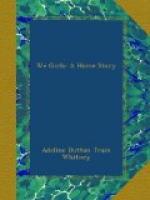Ruth was first, though. She kept her little bolt drawn all night, between her room and that of Barbara and Rose. At five o’clock, she went softly across the passage to Stephen’s room, in her little wrapper and knit slippers. “I shall be ready in ten minutes,” she whispered, right into his ear, and into his dream.
“Scat!” cried Stephen, starting up bewildered.
And Ruth “scatted.”
Down on the front piazza, twenty minutes after, she superintended the tucking in of the kittens, and then told him to bring a mallet and wedge. She had been very particular to have the kittens put under at a precise place, though there was a ready-made hole farther on. The cat babies mewed and sprawled and dragged themselves at feeble length on their miserable little legs, as small blind kittiewinks are given to doing.
“They won’t go far,” said Ruth. “Now, let’s take this board up.”
“What—for?” cried Stephen, again.
“To get them out, of course,” says Ruth.
“Well, if girls ain’t queer! Queerer than cats!”
“Hush!” said Ruth, softly. “I believe—but I don’t dare say a word yet—there’s something there!”
“Of course there is. Two little yowling—”
“Something we all want found, Steve,” Ruth whispered, earnestly. “But I don’t know. Do hush! Make haste!”
Stephen put down his face to the crack, and took a peep. Rather a long serious peep. When he took his face back again, “I see something,” he said. “It’s white paper. Kind of white, that is. Do you suppose, Ruth—? My cracky! if you do!”
“We won’t suppose,” said Ruth. “We’ll hammer.”
Stephen knocked up the end of the board with the mallet, and then he got the wedge under and pried. Ruth pulled. Stephen kept hammering and prying, and Ruth held on to all he gained, until they slipped the wedge along gradually, to where the board was nailed again, to the middle joist or stringer. Then a few more vigorous strokes, and a little smart levering, and the nails loosened, and one good wrench lifted it from the inside timber and they slid it out from under the house-boarding.
Underneath lay a long, folded paper, much covered with drifts of dust, and speckled somewhat with damp. But it was a dry, sandy place, and weather had not badly injured it.
“Stephen, I am sure!” said Ruth, holding Stephen back by the arm. “Don’t touch it, though! Let it be, right there. Look at that corner, that lies opened up a little. Isn’t that grandfather’s writing?”
[Illustration]
It lay deep down, and not directly under. They could scarcely have reached it with their hands. Stephen ran into the parlor, and brought out an opera-glass that was upon the table there.
“That’s bright of you, Steve!” cried Ruth.
Through the glass they discerned clearly the handwriting. They read the words, at the upturned corner,—“heirs after him.”




